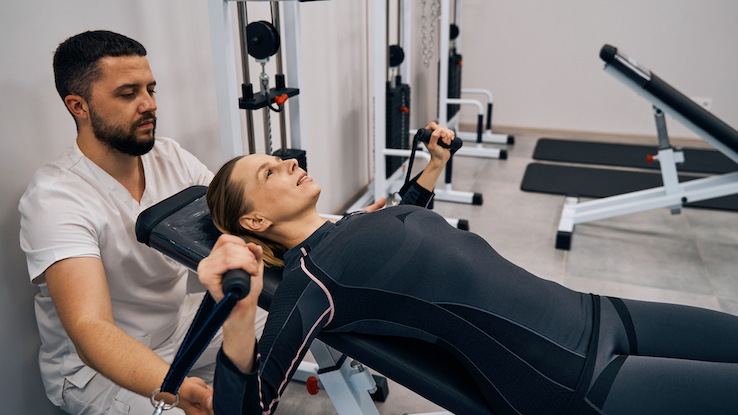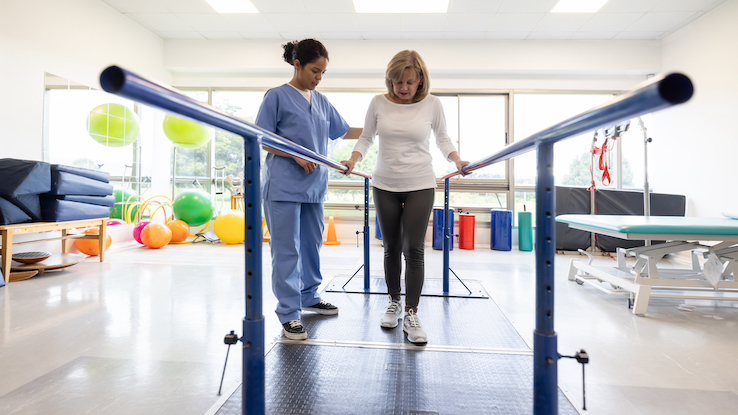What Is Kinesiology?

Kinesiology is a scientific field that studies the movement of the human body and its impact on health and overall well-being. Studying the science of body mechanics can serve as the foundation for a wide array of careers in sports, medicine and more.
Even for the casual learner, understanding the basics of how the body works can serve as a way to improve overall physical functioning and health. Let’s break down exactly what the study of kinesiology concerns itself with and what kinesiologists do.
Understanding Kinesiology Basics

Kinesiology studies the mechanics of the human body in much the same way that auto mechanics study the different parts of vehicles. Just as a flat tire or a blown fuse can affect the entire functioning of a car, things like poor joint mobility or muscle endurance can have an effect on a person’s overall mental and physical health.
Kinesiology encompasses several different sciences and fields of study, including:
- Epidemiology: Epidemiology looks at how and why things like a proper diet, exercise and other physical activities can help prevent disease and contribute to overall physical health and fitness.
- Motor Control and Learning: Motor control and learning explore how the nervous system sends messages to the body to direct its movement and functioning. It can also explore ways to help people regain motor skills they may have lost through trauma or illness.
- Anatomy: Anatomy studies the different elements that make up the human body, from the skeletal system and muscles to the organs and nervous system.
- The Biomechanics of Human Movement: Human biomechanics studies how various parts of the human anatomy such as bones, joints and tendons all work together to produce various forms of movement.
- Exercise Psychology and Physiology: Exercise psychology looks into the effect that exercise can have on a person’s mind, while physiology explores the impact it has on the body.
By understanding the intricate functioning of the body, kinesiology provides the “big picture” of how different body functions work together to produce a range of movement. As a field of study, kinesiology explores how the science of movement can impact people on physical, psychological and even sociological levels.
What Is a Kinesiologist?

A kinesiologist is a healthcare professional who uses their knowledge of the workings of the human body and how it moves to help people in various ways. While the overall aim of a kinesiologist is to enhance a person’s quality of life, individual kinesiologists approach this goal in a wide variety of ways.
Though kinesiologists can be found in a wide range of different careers, here are just a few examples of some of the different jobs they might pursue:
- Personal Trainer or Athletic Instructor: Kinesiologists often work for gyms, schools or even private clients as fitness instructors. They use their knowledge of the body to help people achieve their fitness goals in the most efficient way possible. Some kinesiologists also work as fitness consultants. In addition to exercise, fitness consultants can help their clients achieve optimum health and performance through nutrition.
- Exercise Physiologist: Exercise physiologists help their clients approach exercise from a holistic standpoint in order to help alleviate pain or illness. They design exercise routines that can help build muscle or enhance flexibility and stamina in order to allow their clients to enjoy a more active lifestyle.
- Strength and Conditioning Coach: Some kinesiologists pursue a career in athletics as strength and conditioning coaches. Their primary goal is to help athletes achieve their peak physical performance, which can be important when it comes to college or professional sports teams.
- Medical Fields: Kinesiologists can also be found in a range of different medical fields and may go on to study to become doctors, surgeons, medical officers or EMTs. Others help people recover from injuries in roles such as physical therapists or sports medicine physicians. Occupational therapy is another field that many kinesiologists pursue in order to help patients overcome mobility obstacles or regain the essential motor functions and skills needed for everyday life.
- Nutritionist or Dietitian: Kinesiologists can also use their knowledge of the ways that nutrition can affect the body to design nutritional programs. As nutritionists or dietitians, they can find work in hospitals, nursing homes and schools, or specialize in designing meal plans for athletes that promote muscle recovery and stamina.
How to Find Kinesiology Courses

If you’re interested in becoming a kinesiologist, then you’ll find that there are several options available. Which is right for you will largely depend on your long-term goals and what types of kinesiology career you want to pursue.
Many colleges and universities offer kinesiology as a major, as its wide range of applications have made it an increasingly popular field of study. According to Niche, some of the top kinesiology degrees in the United States are offered by schools like Rice University, the University of Southern California and the University of Michigan Ann Arbor. Schools like Eastern Oregon University, American Public University System and Concordia University – Chicago now offer great options for earning an online bachelor’s degree in kinesiology.
If you’re more interested in a certification program, then check out the online courses offered by the Kinesiology Institute. The institute offers a full range of kinesiology tools, books, charts and online courses designed to help students at any level.
If you’re not quite sure if you’re ready to take a full plunge into kinesiology or are more of a casual learner, then there are also several online introductory courses that can serve as a nice introduction. Udemy offers a fully accredited Foundational Level Kinesiology course, while Coursera offers a range of free courses on everything from exercise science to a Yale course on the Science of Well-Being. Functional Kinesiology also offers a great free course that can give you a solid overview of the basics to help you discover whether kinesiology is something you’d like to study further.
From the importance of movement, to maintaining an independent lifestyle, to the positive physical and mental effects that exercise can have on our health, kinesiology offers some fascinating insights into the human body.





